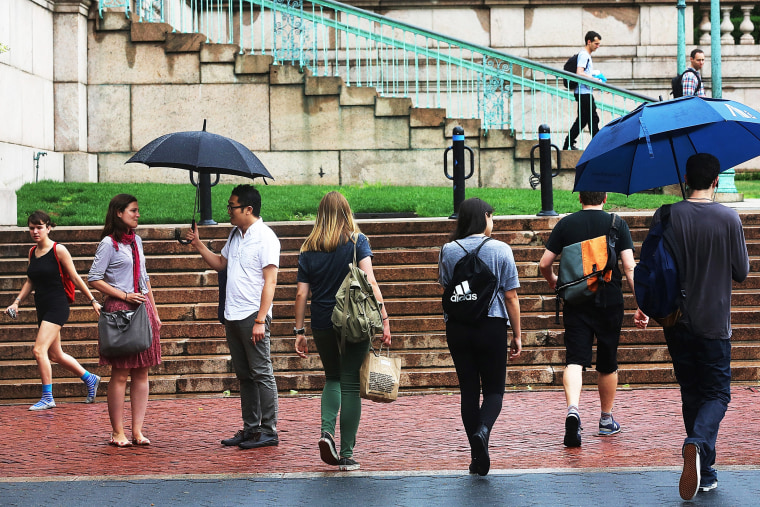Another Ivy League school is facing a complaint over its response to sexual assault reports. A group of 23 students is filing a series of complaints against Columbia University under Title IX, the Clery Act, and Title II over allegations that the school fails in its duty to protect students who are victims of sexual assault.
The more-than-100-page complaint alleges that perpetrators of sexual assault have been allowed to remain on campus, that survivors are often discouraged from reporting assaults, that some survivors were not treated fairly because of their gender identity, and that individuals who protest against the school’s response face retaliation, among other claims.
In a statement released Thursday by a group calling itself Our Stories CU, the students behind the complaints accused Columbia of being “more willing to silence and punish survivors and their supporters than serial rapists,” and that they took action “to hold the university accountable for its deliberate mishandling of campus sexual violence and mental health,” according to a report on student-run news site Bwog.
News of the complaints comes on the heels of a story about a mishandled rape case at Brown wherein a student suspended for violently raping a classmate is set to return to school despite objections from his victim. While a university representative told Brown's student paper that the school's sexual assault policy would be discussed at a community council meeting, the decision to allow the perpetrator back on campus has not been revisited.
Based on the growing swell of outrage over campus safety and sexual assault, the Columbia complaint is unsurprising. Students filed a similar complaint against Harvard University at the beginning of April; an open letter published in The Harvard Crimson from an assault survivor alleged repeated misconduct on the part of administrators; Dartmouth College is in the midst of discussions over new rules for dealing with sexual assault after a complaint was filed last May; sixteen Yale students filed a Title IX complaint in 2011, and the Department of Education's investigation was closed in 2012.
Title IX requires any educational program that receives federal money to provide equitable services to women and men. Preventing sexual harassment and assault, and ensuring that institutions respond to reports in a way that does not interfere with a survivor’s education is a legal requirement. Schools that do not meet those standards risk losing federal funding.
Under the Cleary Act, colleges and universities must disclose information about crime on and near their campuses that includes provisions to protect the rights of sexual assault survivors. Schools can be punished for violations with fines. Title II is a portion of the Americans with Disabilities Act that mandates schools provide adequate accommodations to students with disabilities.
Students have filed complaints against the University of Connecticut, and the University of North Carolina, where Department of Education investigators recently began meeting with students to gather information about possible Clery Act violations. Occidental College in California settled a lawsuit with female students in 2013.
That same year, news broke that Princeton had kept secret for five years a survey that showed one in six female students reported non-consensual penetration during their time at school. University representatives argued at the time that the numbers were not newsworthy because the school’s rates of assault were not higher than other colleges.
Legislators, many of whom were involved in efforts to reduce sexual assault in the military, have begun to push for more information about the scope of the problem. Sens. Kirsten Gillibrand, D-NY, and Claire McCaskill, D-MO, have joined forces to request more money for investigations into sexual assault on campus. McCaskill also recently launched a survey to get more information from schools. Rep. Jackie Speier, D-CA, and a bipartisan group of House members sent a letter to U.S. News and World Report asking it to make campus safety part of its assessment process for its annual college rankings.
As the fight over legislation to stop military sexual assault showed, efforts by lawmakers are not the most efficient course of action. Meanwhile, groups like End Rape on Campus are encouraging more students to file suits and raising awareness about how pervasive sexual assault and harassment is at colleges and universities.
Our Stories CU has set up a form and email address for other students who might be interested in joining the complaints against Columbia.
